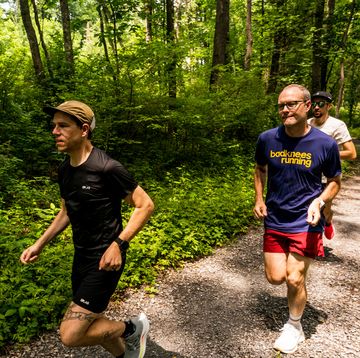Overtraining is one of those nebulous catchall terms that coaches and athletes fear like the plague. The problem that coaches face isn’t prodding highly competitive and slightly obsessive-compulsive runners to do more work. Instead, the issue is holding them back—just enough to keep them from entering this unwanted zone where the body has reached its limits to adapt and recover.
Physiologically, overtraining occurs when the muscles don’t fully repair from training-related damage, the hormones rebel, and the nervous system switches into a stressed state. All of these consequences can happen as a result of an imbalance of training stress and recovery. The prescription is usually to rest or reduce the training load.
But from a psychobiological standpoint, this makes little sense. We may be giving the body physical recovery, but we fail to realize that rest often creates an overreaction in the body. A recent study showed that when endurance athletes were forced to take time off, symptoms of depression and mood changes increased. It’s comparable to the physical reaction we get with a stress fracture—the bone will heal more quickly if we provide a small amount of weight-bearing stimulus, instead of simply using crutches and putting no weight on the bone at all.
Many modern-day diseases are now classified as diseases of civilization because they are related to our insistence on comfort and monotony. We strive to eliminate all stressors from life and end up with chronic low-grade stress instead of a natural ebb and flow of acute stress with a nice recovery period. What we often see in our overtraining is either too much work or too little recovery—to fix that, we go to the other extreme of full recovery and no stress.
Instead, we should restore this natural ebb and flow of acute stress and recovery. The following strategies can be used to combat overtraining syndrome and reset your body so that you can make yourself resilient:
Train differently. The simple act of doing the same type or pattern of training leads to an increased likelihood of overtraining. The monotony creates a lack of mental and physical stimulus from which to adapt. Introduce something new. Do a different workout, go to a new training venue, or even break away from the restricted interval workout to a free-flowing fartlek. Institute big modulation—large variations in the amount, intensity, and type of training each day of the week, instead of a normal pattern.
Go outside. A study published in the British Journal of Sports Medicine found that doing exercise in outdoor spaces had a large impact on a variety of moods related to restoring willpower and creating a positive recovery state. Instead of jumping on the treadmill, go outside for a run or take the ElliptiGO for a spin (if you’re cross-training). Simply being outside will help put you in a better place to recover.
Introduce mini-workouts. Another study in the Journal of Sports Science and Medicine showed that overtraining was related to a high and low training load, meaning that those who trained too easy also showed signs of stress. To combat this, introduce mini-workouts. For example, instead of doing a full-blown interval workout, do one that includes about 60 to 70 percent of the volume—if you would normally do 10 x 400m in 75 seconds, do 6 x 400m at the same pace. By reducing the volume of the workout and keeping the intensity, you still get a small physiological stressor without pushing yourself over the edge physically or mentally.
* * *
Steve Magness coaches professional runners and the cross country team at the University of Houston, where he is pursuing a doctorate in exercise science.
Steve Magness is a performance coach who has worked with Olympians and professional sports teams. His new book is Run Through Overtraining Syndrome.













